
The Indonesian National Revolution, or the Indonesian War of Independence, was an armed conflict and diplomatic struggle between the Republic of Indonesia and the Dutch Empire and an internal social revolution during postwar and postcolonial Indonesia. It took place between Indonesia's declaration of independence in 1945 and the Netherlands' recognition of Indonesia's independence at the end of 1949.
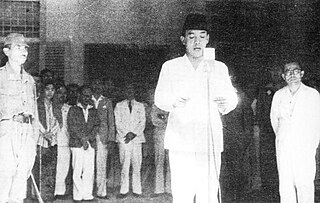
The Proclamation of Indonesian Independence was read at 10:00 on Friday, 17 August 1945 in Jakarta. The declaration marked the start of the diplomatic and armed resistance of the Indonesian National Revolution, fighting against the forces of the Netherlands and pro-Dutch civilians, until the latter officially acknowledged Indonesia's independence in 1949. The document was signed by Sukarno and Mohammad Hatta, who were appointed president and vice-president respectively the following day.

The Linggardjati Agreement was a political accord concluded on 15 November 1946 by the Dutch administration and the unilaterally declared Republic of Indonesia in the village of Linggarjati, Kuningan Regency, near Cirebon in which the Dutch recognised the republic as exercising de facto authority in Java, Madura and Sumatra.

Holy See and Indonesia established diplomatic relations in 1950. Relations are important as part of global interfaith dialogue, because Indonesia has the world's largest Muslim-majority population. Indonesia recognizes Roman Catholicism as one of its six approved religions. The Holy See has a nunciature in Jakarta, while Indonesia has an embassy in Rome.
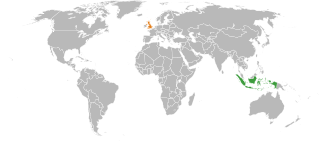
Indonesia and the United Kingdom established diplomatic relations in 1949 and have maintained strong relations since then. Indonesia has an embassy in London while the United Kingdom has an embassy in Jakarta. The United Kingdom considers Indonesia an increasingly important partner globally is committed to efforts to take bilateral relations to new heights, as well as the humanitarian response to the December 2004 Indian Ocean tsunami, which claimed the lives of 150 British citizens. Both nations are members of G-20 major economies.

Indonesia and the Netherlands established diplomatic relations in 1949. Both countries share a special relationship, embedded in their shared history of colonial interactions for centuries. It began during the spice trade as the Netherlands established the Dutch East Indies Company (VOC) trading post in what is now Indonesia, before colonising it as the Dutch East Indies until the mid 20th century. Indonesia was the largest former Dutch colony. In the early 21st century, the Dutch government has committed to boosting its relationship with Indonesia, noting that economic, political, and interpersonal contacts should be further strengthened.
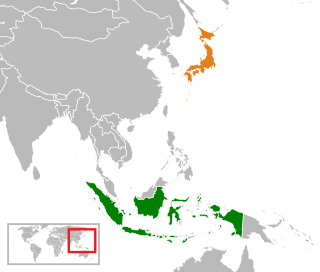
Indonesia and Japan established diplomatic relations in 1958. Both are two Asian nations that share historical, economic, and political ties. Both nations went through a difficult period in World War II when the then Dutch East Indies was occupied by the Imperial Japanese Army for three-and-a-half years. Japan is a major trading partner for Indonesia. Japan is Indonesia's largest export partner and also a major donor of development aid to Indonesia through Japan International Cooperation Agency. Indonesia is a vital supplier of natural resources such as liquefied natural gas to Japan. Both countries are members of the G20 and APEC. Today in Indonesia, there are about 11,000 Japanese expatriates whereas in Japan, there are approximately 24,000 Indonesian nationals working and training.

Indonesia and Portugal established diplomatic relations in 1950. Portuguese explorer and trader first reached Indonesian archipelago during the age of exploration in the 16th century in order to search for spices in the Indies.

France and Indonesia established diplomatic relations in 1951. The indirect relation between France and Indonesia was commenced during early 19th century colonial Dutch East Indies. Since 2011 both nations have formed a strategic partnership.

Indonesia and Sri Lanka established diplomatic relations in 1952. Both nations share some cultural similarities. Indonesia and Sri Lanka are members of the World Trade Organization. They are founding members of the Non-Aligned Movement. Indonesia has an embassy in Colombo, while Sri Lanka has an embassy in Jakarta.
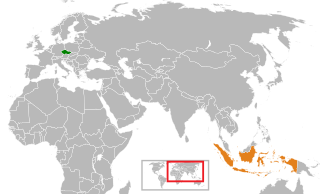
Czech Republic and Indonesia established diplomatic relations in 1950. Both nations has agreed to forge ties to deepen relations, especially in business and trade sector. Indonesia has an embassy in Prague, while Czech Republic has an embassy in Jakarta that also accredited to Brunei, Timor Leste, Singapore and ASEAN, and honorary consulates in Bali, Makassar and Surabaya.

Indonesia and Norway established diplomatic relations in 1950. Since then, Indonesia and Norway has been cooperating in areas, such as climate and energy, democracy and human rights, international political issues and trade. Both nations has agreed to establish a strategic partnership against poverty and climate change, and also in promoting democracy and tolerance. Indonesia has an embassy in Oslo, while Norway has an embassy in Jakarta.
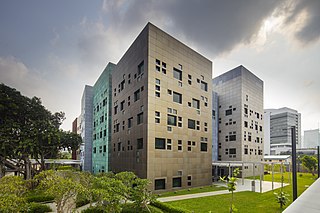
The Embassy of Australia in Jakarta is the diplomatic mission of Australia in Indonesia, located within the Golden Triangle.

The Consulate General of the United States in Surabaya is an American diplomatic mission in Surabaya, East Java and only consulate general and one of the four American diplomatic and consular posts in Indonesia. The Consulate General in Surabaya leads for the U.S. diplomatic mission in the 12 provinces of middle and eastern Indonesia over a third of Indonesia's population

The Consulate-General of Japan, Surabaya is a Japanese diplomatic mission to Indonesia in Surabaya, East Java. The first Japanese diplomatics in Surabaya was established on 13 March 1920 while the city was under rule of Dutch East Indies. In 1979, the consulate was upgraded its status to Consulate-General. The General-Consulate in Surabaya leads for Japanese diplomatic mission in the 4 provinces and 8 provinces with the consulat office (branch) in Makassar. The seat of consulate-general is located at Jalan Sumatera No.93, Gubeng, Surabaya. Masaki Tani is current consul general in Surabaya.

The Australian Consulate-General in Surabaya represents the Commonwealth of Australia in Surabaya, the second most populous city in Indonesia. The Consulate-General of Australia in Surabaya was established in February 2017, and is the fourth diplomatic mission of Australia in Indonesia after Jakarta (1935), Denpasar (1981), and Makassar (2016). The seat of consulate-general located at Level 3 ESA Sampoerna Center, Sukolilo, Surabaya, East Java. Chris Barnes is the first and current consul-general in Surabaya.

The Embassy of China in Jakarta is the diplomatic mission of the People's Republic of China in Indonesia, located in the Kuningan area of the Golden Triangle, Jakarta. It was reestablished in 1990 after the normalization of China–Indonesia relations, having been first established in 1950 at a separate location in Glodok.


















